- Home
- Jack Canfield
A 2nd Helping of Chicken Soup for the Soul Page 6
A 2nd Helping of Chicken Soup for the Soul Read online
Page 6
Page 36
woman, waves her away, saying, 'It's a scratch. Don't worry."
Senseless acts of beauty spread: A man plants daffodils along the roadway, his shirt billowing in the breeze from passing cars. In Seattle, a man appoints himself a one-man vigilante sanitation service and roams the concrete hills collecting litter in a supermarket cart. In Atlanta, a man scrubs graffiti from a green park bench.
They say you can't smile without cheering yourself up a littlelikewise, you can't commit a random kindness without feeling as if your own troubles have been lightened if only because the world has become a slightly better place.
And you can't be a recipient without feeling a shock, a pleasant jolt. If you were one of those rush-hour drivers who found your bridge fare paid, who knows what you might have been inspired to do for someone else later? Wave someone on in the intersection? Smile at a tired clerk? Or something larger, greater? Like all revolutions, guerrilla goodness begins slowly, with a single act. Let it be yours.
Adair Lara
It's the action, not the fruit of the action,
that's important. You have to do the right
thing. It may not be in your power, may not
be in your time, that there'll be any fruit.
But that doesn't mean you stop doing the
right thing. You may never know what
results come from your action. But if you do
nothing, there will be no result.
Gandhi
Page 37
Two Brothers
Two brothers worked together on the family farm. One was married and had a large family. The other was single. At the day's end, the brothers shared everything equally, produce and profit.
Then one day the single brother said to himself, ''It's not right that we should share equally the produce and the profit. I'm alone and my needs are simple." So each night he took a sack of grain from his bin and crept across the field between their houses, dumping it into his brother's bin.
Meanwhile, the married brother said to himself, "It's not right that we should share the produce and the profit equally. After all, I'm married and I have my wife and children to look after me in years to come. My brother has no one, and no one to take care of his future." So each night he took a sack of grain and dumped it into his single brother's bin.
Both men were puzzled for years because their supply of grain never dwindled. Then one dark night the two brothers bumped into each other. Slowly it dawned on them what was happening. They dropped their sacks and embraced one another.
Author Unknown
from More Sower's Seeds by Brian Cavanaugh
Page 38
The Heart
The best and most beautiful things in the
world cannot be seen, nor touched . . . but
are felt in the heart.
Helen Keller
My wife and I separated in late December and, as you might expect, I had a very difficult January. During a therapy session to help me handle the emotional turmoil stirred up by the split, I asked my therapist to give me something to help me in my new life. I had no idea whether she would agree and, if she did, I had no idea what she might offer.
I was happy that she immediately did agree and, as I expected, she gave me something totally unexpected! She handed me a heart, a small handmade Play-Doh® heart, brightly and lovingly painted. It had been given to her by a previous male client who had also gone through a divorce and who, like myself, had difficulty accessing his feelings. She added that it was not for me to keep, but only to hold onto until I got my own heart. Then I must return it to her. I understood that she was giving me a physical heart as a visual goal or as some kind of material representation of my own quest for a richer emotional life. I accepted it with anticipation of deeper emotional connections to come.
Page 39
Little did I realize how quickly that wonderful gift would actually start to work.
After the session, I placed the heart carefully on the dash of my car and drove excitedly to pick up my daughter Juli-Ann, for this was the first night that she would be sleeping over at my new home. As she got into the car, she was immediately drawn to the heart, picking it up, examining it and asking me what it was. I was unsure whether I should explain the full psychological background because, after all, she was still a child. But I decided that I would tell her.
"It's a present from my therapist to help me through this difficult time and it is not for me to keep, but only to have till I get my own heart," I explained. Juli-Ann made no comment. I wondered again if I should have told her. At 11 years old, could she understand? What possible idea could she have of the huge chasm I was attempting to bridge to break my old patterns and develop deeper, richer loving connections with people?
Weeks later, when my daughter was again at my home, she handed me my Valentine's Day present early: a small box that she had painted red, tied daintily with a gold band, topped by a chocolate that we shared. With anticipation, I reached into the pretty little box. To my surprise, I pulled out a Play-Doh® heart that she had made for me and painted. I looked quizzically at her, wondering what it meant. Why was she giving me a replica of what my therapist had given me?
Then she slowly handed me a card she had made. She was embarrassed about the card but then finally allowed me to open it and read it. It was a poem far beyond her years. She had understood totally the meaning of the gift from my therapist. Juli-Ann had written me the most touching and loving poem I have
Page 40
ever read. Tears flooded my eyes and my heart burst open:
For My Dad
Here is a heart
For you to keep
For the big leap
You're trying to take.
Have fun on your journey.
It might be blurry.
But when you get there,
Learn to care.
Happy Valentine's Day
Love, Your Daughter, Juli-Ann
Above all my material wealth, I count this poem as my most sacred treasure.
Raymond L. Aaron
Page 41
Christmas Day in the Morning
He woke suddenly and completely. It was four o'clock, the hour at which his father had always called him to get up and help with the milking. Strange how the habits of his youth clung to him still! His father had been dead for 30 years, and yet he waked at four o'clock in the morning. He had trained himself to turn over and go to sleep, but this morning, because it was Christmas, he did not try. Yet what was the magic of Christmas now? His own children had grown up and gone. He was left alone with his wife. Yesterday she had said, "Let's not trim the tree until tomorrow, Robert. I'm tired." He had agreed, and so the tree remained out in the back entry.
Why did he feel so awake tonight? For it was still night, clear and starry. No moon, of course, but the stars were extraordinary! Now that he thought of it, the stars seemed always large and clear before the dawn of Christmas Day. There was one star now that was certainly larger and brighter than any of the others. He could even imagine it moving, as it had seemed to him to move one night long ago.
He was 15 years old and still on his father's farm. He loved his father. He had not known it until one day a few days before Christmas, when he had overheard what his father was saying to his mother.
Page 42
"Mary, I hate to call Rob in the mornings. He's growing so fast and he needs his sleep. If you could see how he sleeps when I go in to wake him up! I wish I could manage alone."
"Well, you can't, Adam." His mother's voice was brisk. "Besides, he isn't a child anymore. It's time he took his turn."
"Yes," his father said slowly. "But I sure do hate to wake him."
When he heard these words, something in him woke: His father loved him! There would be no more loitering in the mornings and having to be called again. He got up after that, stumbling blind with sleep, and pulled on his clothes, his eyes tightly shut, but he got up.
> And then on the night before Christmas, that year when he was 15, he lay for a few minutes thinking about the next day.
He wished he had a better present for his father. As usual, he had gone to the ten-cent store and bought a tie for his father. It had seemed nice enough until he lay thinking, and then he wished that he had heard his father and mother talking in time for him to save for something better.
He lay on his side, his head supported by his elbow, and looked out of his attic window. The stars were bright, much brighter than he ever remembered seeing them, and one star in particular was so bright that he wondered if it were really the Star of Bethlehem.
"Dad," he had once asked when he was a little boy, "what is a stable?"
"It's just a barn," his father had replied, "like ours."
Then Jesus had been born in a barn, and to a barn the shepherds and the Wise Men had come, bringing their Christmas gifts!
Page 43
The thought struck him. Why should he not give his father a special gift too, out there in the barn? He could get up early, earlier than four o'clock, and creep into the barn and get all the milking done. He'd do it alone, milk and clean up, and then when his father went in to start the milking, he'd see it all done. And he would know who had done it.
He laughed to himself as he gazed at the stars. It was what he would do, and he mustn't sleep too sound.
He must have waked 20 times, scratching a match each time to look at his old watchmidnight, and half-past one, and then two o'clock.
At a quarter to three he got up and put on his clothes. He crept downstairs, careful of the creaky boards, and let himself out. The big star hung lower over the barn roof, a reddish gold. The cows looked at him, sleepy and surprised. It was early for them, too.
He fetched some hay for each cow and then got the milking pail and the big milk cans.
He smiled, thinking about his father, and milked steadily, two strong streams rushing into the pail, frothing and fragrant. The task went more easily than he had ever known it to before. Milking for once was not a chore. It was something else, a gift to his father who loved him. He finished, the two milk cans were full, and he covered them and closed the milk house door carefully, making sure of the latch. He put the stool in its place by the door and hung up the clean milk pail. Then he went out of the barn and barred the door behind him.
Back in his room, he had only a minute to pull off his clothes in the darkness and jump into bed, for he heard his father up. He put the covers over his head to silence his quick breathing. The door opened.
"Rob!" his father called. "We have to get up, son, even if it is Christmas."
Page 44
"Aw-right," he said sleepily.
"I'll go on out," his father said. "I'll get things started."
The door closed and he lay still, laughing to himself. In just a few minutes his father would know.
The minutes were endlessten, fifteen, he did not know how manyand he heard his father's footsteps again. The door opened and he lay still.
"Rob!"
"Yes, Dad"
"You son of a" His father was laughing, a queer sobbing sort of a laugh. "Thought you'd fool me, did you?" His father was standing beside his bed, feeling for him, pulling away the cover.
"It's for Christmas, Dad!"
He found his father and clutched him in a great hug. He felt his father's arms go around him. It was dark and they could not see each other's faces.
"Son, I thank you. Nobody ever did a nicer thing"
"Oh, Dad, I want you to know" The words broke from him of their own will. He did not know what to say. His heart was bursting with love.
"Well, I reckon I can go back to bed and sleep," his father said after a moment. "Nothe little ones are waked up. Come to think of it, I've never seen you children when you first saw the Christmas tree. I was always in the barn. Come on!"
He got up and pulled on his clothes again and they went down to the Christmas tree, and soon the sun was creeping up to where the star had been. Oh, what a Christmas, and how his heart had nearly burst again with shyness and pride as his father told his mother and made the younger children listen about how he, Rob, had got up all by himself.
"The best Christmas gift I ever had, and I'll remember it, son, every year on Christmas morning, so long as I live."
Page 45
Outside the window now, the great star slowly sank. He got up, put on his slippers and bathrobe, went softly upstairs to the attic and found the box of Christmas tree decorations. He took them downstairs into the living room. Then he brought in the tree. It was a little onethey had not had a big tree since the children went awaybut he set it in the holder. Then carefully he began to trim it. It was done very soon, the time passing as quickly as it had that morning long ago in the barn.
He went to his library and fetched the little box that contained his gift to his wife, a star of diamonds, not large but dainty in design. He tied the gift on the tree and then stood back. It was pretty, very pretty, and she would be surprised.
But he was not satisfied. He wanted to tell herto tell her how much he loved her. It had been a long time since he had really told her, although he loved her in a special way, much more than he ever had when they were young. That was the true joy of life, the ability to love! He was quite sure that some people were genuinely unable to love anyone. But love was alive in him, it still was.
It occurred to him suddenly that it was alive because long ago it had been born in him when he knew his father loved him. That was it: love alone could waken love.
And he could give the gift again and again. This morning, this blessed Christmas morning, he would give it to his beloved wife. He could write it down in a letter for her to read and keep forever. He went to his desk and began his love letter to his wife: "My dearest love . . ."
Pearl S. Buck
Page 46
Do It Now!
If we discovered that we had only five minutes left to say all that we wanted to say, every telephone booth would be occupied by people calling other people to stammer that they loved them.
Christopher Morley
In a class I teach for adults, I recently did the "unpardonable." I gave the class homework! The assignment was to "go to someone you love within the next week and tell them you love them. It has to be someone you have never said those words to before or at least haven't shared those words with for a long time."
Now that doesn't sound like a very tough assignment, until you stop to realize that most of the men in that group were over 35 and were raised in the generation of men that were taught that expressing emotions is not "macho." Showing feelings or crying (heaven forbid!) was just not done. So this was a very threatening assignment for some.
At the beginning of our next class, I asked if someone wanted to share what happened when they told someone they loved them. I fully expected one of the women to volunteer, as was usually the case, but on this evening one of the men raised his hand. He
Page 47
appeared quite moved and a bit shaken.
As he unfolded out of his chair (all 6'2'' of him), he began by saying, "Dennis, I was quite angry with you last week when you gave us this assignment. I didn't feel that I had anyone to say those words to, and besides, who were you to tell me to do something that personal? But as I began driving home my conscience started talking to me. It was telling me that I knew exactly who I needed to say 'I love you' to. You see, five years ago, my father and I had a vicious disagreement and really never resolved it since that time. We avoided seeing each other unless we absolutely had to at Christmas or other family gatherings. But even then, we hardly spoke to each other. So, last Tuesday by the time I got home I had convinced myself I was going to tell my father I loved him.

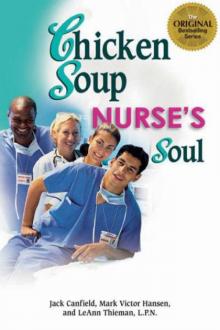 Chicken Soup for the Nurse's Soul: Second Dose
Chicken Soup for the Nurse's Soul: Second Dose Chicken Soup for the Ocean Lover's Soul
Chicken Soup for the Ocean Lover's Soul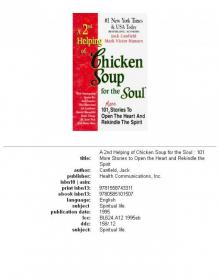 A 2nd Helping of Chicken Soup for the Soul
A 2nd Helping of Chicken Soup for the Soul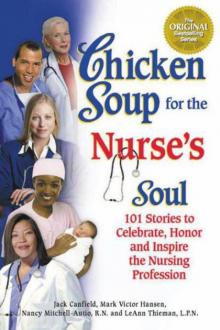 Chicken Soup for the Nurse's Soul
Chicken Soup for the Nurse's Soul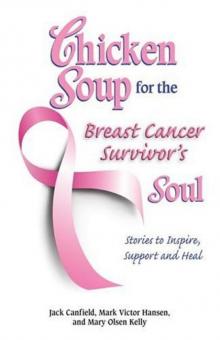 Chicken Soup for the Breast Cancer Survivor's Soul
Chicken Soup for the Breast Cancer Survivor's Soul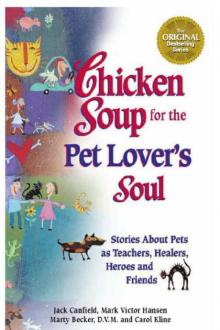 Chicken Soup for the Pet Lover's Soul
Chicken Soup for the Pet Lover's Soul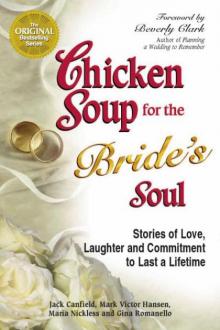 Chicken Soup for the Bride's Soul
Chicken Soup for the Bride's Soul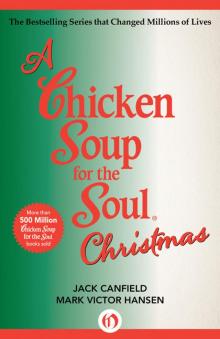 A Chicken Soup for the Soul Christmas
A Chicken Soup for the Soul Christmas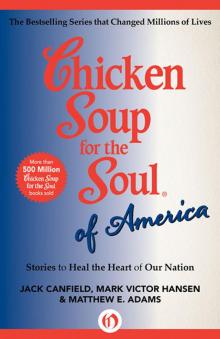 Chicken Soup for the Soul of America
Chicken Soup for the Soul of America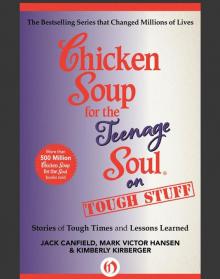 Chicken Soup for the Teenage Soul on Tough Stuff
Chicken Soup for the Teenage Soul on Tough Stuff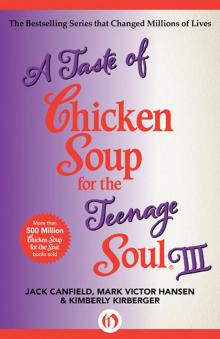 A Taste of Chicken Soup for the Teenage Soul III
A Taste of Chicken Soup for the Teenage Soul III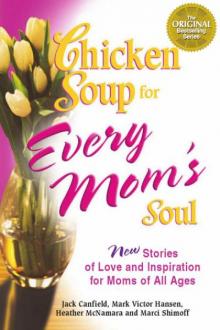 Chicken Soup for Every Mom's Soul
Chicken Soup for Every Mom's Soul Chicken Soup for the Dog Lover's Soul
Chicken Soup for the Dog Lover's Soul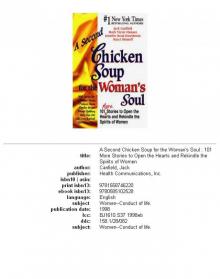 A Second Chicken Soup for the Woman's Soul
A Second Chicken Soup for the Woman's Soul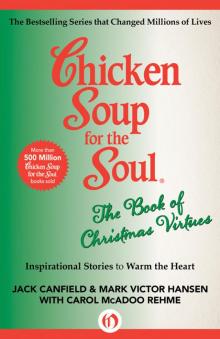 Chicken Soup for the Soul the Book of Christmas Virtues
Chicken Soup for the Soul the Book of Christmas Virtues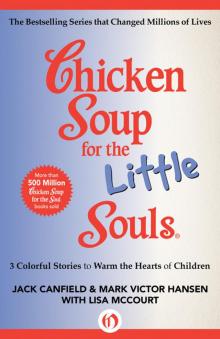 Chicken Soup for the Little Souls: 3 Colorful Stories to Warm the Hearts of Children
Chicken Soup for the Little Souls: 3 Colorful Stories to Warm the Hearts of Children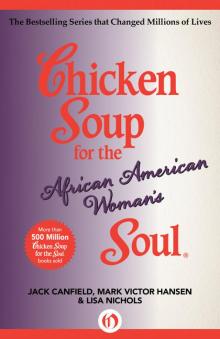 Chicken Soup for the African American Woman's Soul
Chicken Soup for the African American Woman's Soul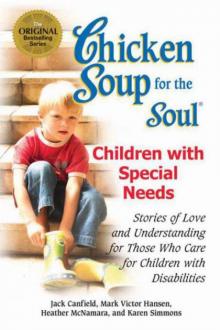 Chicken Soup for the Soul
Chicken Soup for the Soul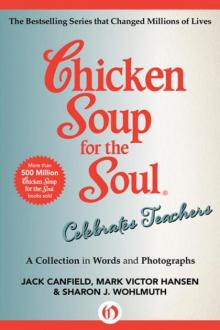 Chicken Soup for the Soul Celebrates Teachers
Chicken Soup for the Soul Celebrates Teachers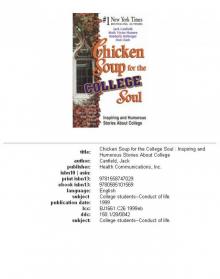 Chicken Soup for the College Soul
Chicken Soup for the College Soul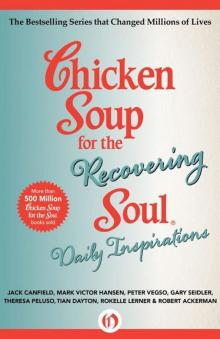 Chicken Soup for the Recovering Soul Daily Inspirations
Chicken Soup for the Recovering Soul Daily Inspirations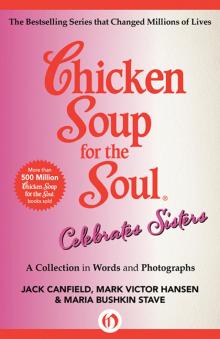 Chicken Soup for the Soul Celebrates Sisters
Chicken Soup for the Soul Celebrates Sisters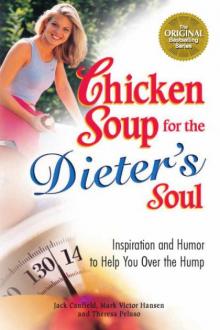 Chicken Soup for the Dieter's Soul
Chicken Soup for the Dieter's Soul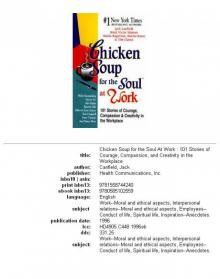 Chicken Soup for the Soul at Work 101 Stories of Courage
Chicken Soup for the Soul at Work 101 Stories of Courage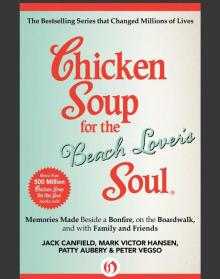 Chicken Soup for the Beach Lover's Soul
Chicken Soup for the Beach Lover's Soul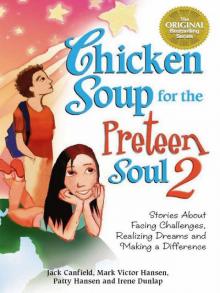 Stories About Facing Challenges, Realizing Dreams and Making a Difference
Stories About Facing Challenges, Realizing Dreams and Making a Difference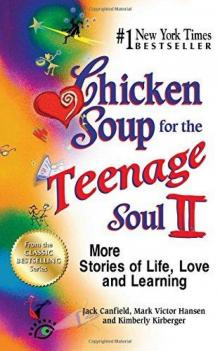 Chicken Soup for the Teenage Soul II
Chicken Soup for the Teenage Soul II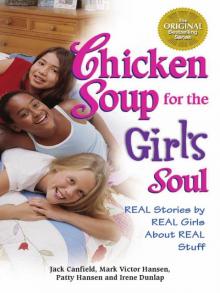 Chicken Soup for the Girl's Soul
Chicken Soup for the Girl's Soul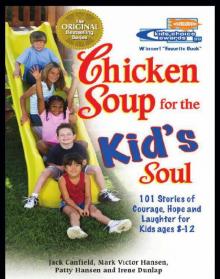 Chicken Soup for the Kid's Soul: 101 Stories of Courage, Hope and Laughter
Chicken Soup for the Kid's Soul: 101 Stories of Courage, Hope and Laughter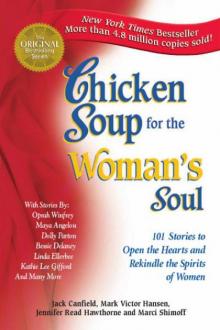 Chicken Soup for the Woman's Soul
Chicken Soup for the Woman's Soul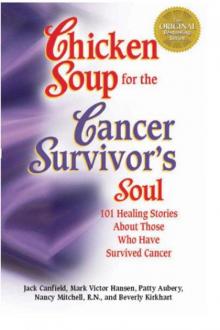 Chicken Soup for the Cancer Survivor's Soul
Chicken Soup for the Cancer Survivor's Soul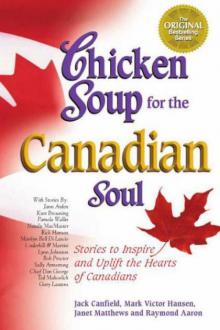 Chicken Soup for the Canadian Soul
Chicken Soup for the Canadian Soul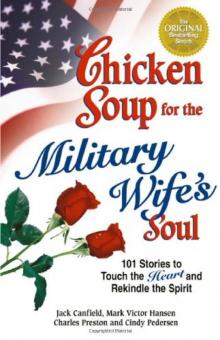 Chicken Soup for the Military Wife's Soul
Chicken Soup for the Military Wife's Soul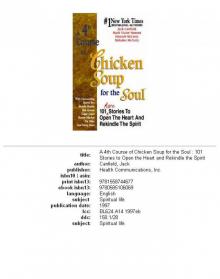 A 4th Course of Chicken Soup for the Soul
A 4th Course of Chicken Soup for the Soul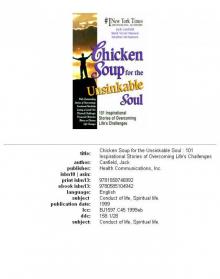 Chicken Soup Unsinkable Soul
Chicken Soup Unsinkable Soul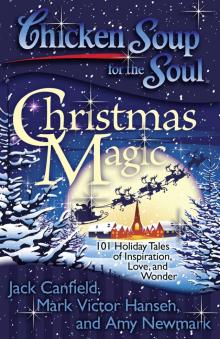 Chicken Soup for the Soul: Christmas Magic
Chicken Soup for the Soul: Christmas Magic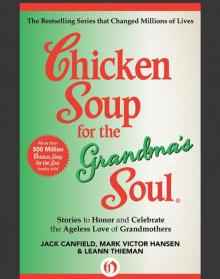 Chicken Soup for the Grandma's Soul
Chicken Soup for the Grandma's Soul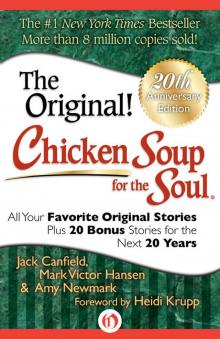 Chicken Soup for the Soul: All Your Favorite Original Stories
Chicken Soup for the Soul: All Your Favorite Original Stories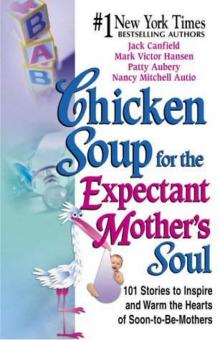 Chicken Soup for the Expectant Mother's Soul
Chicken Soup for the Expectant Mother's Soul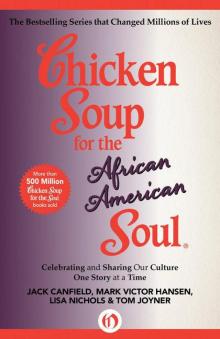 Chicken Soup for the African American Soul
Chicken Soup for the African American Soul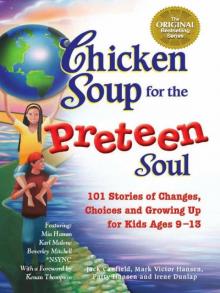 101 Stories of Changes, Choices and Growing Up for Kids Ages 9-13
101 Stories of Changes, Choices and Growing Up for Kids Ages 9-13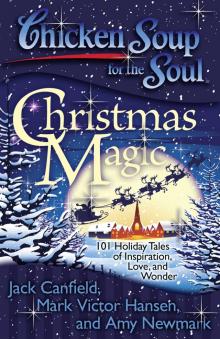 Christmas Magic
Christmas Magic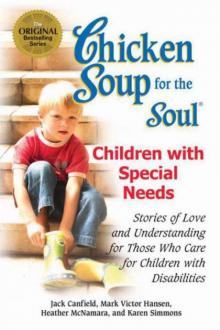 Chicken Soup for the Soul: Children with Special Needs
Chicken Soup for the Soul: Children with Special Needs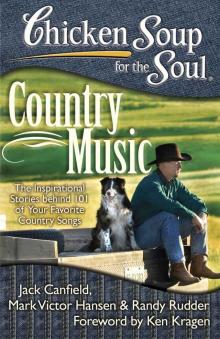 Chicken Soup for the Soul: Country Music: The Inspirational Stories behind 101 of Your Favorite Country Songs
Chicken Soup for the Soul: Country Music: The Inspirational Stories behind 101 of Your Favorite Country Songs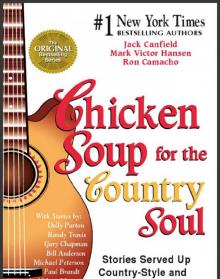 Chicken Soup for the Country Soul
Chicken Soup for the Country Soul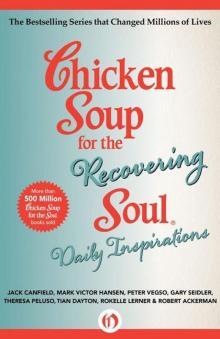 Chicken Soup for the Recovering Soul Daily Inspirations (Chicken Soup for the Soul)
Chicken Soup for the Recovering Soul Daily Inspirations (Chicken Soup for the Soul)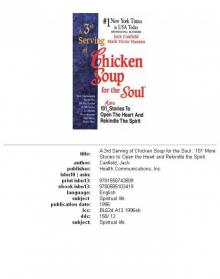 A 3rd Serving of Chicken Soup for the Soul
A 3rd Serving of Chicken Soup for the Soul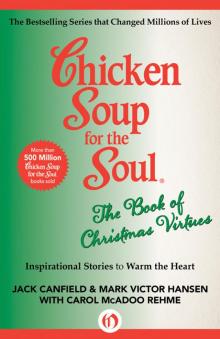 The Book of Christmas Virtues
The Book of Christmas Virtues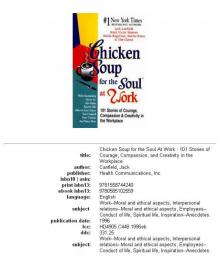 Chicken Soup for the Soul at Work
Chicken Soup for the Soul at Work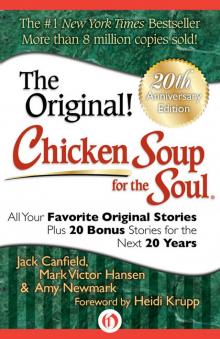 Chicken Soup for the Soul 20th Anniversary Edition
Chicken Soup for the Soul 20th Anniversary Edition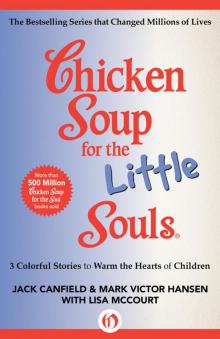 Chicken Soup for the Little Souls
Chicken Soup for the Little Souls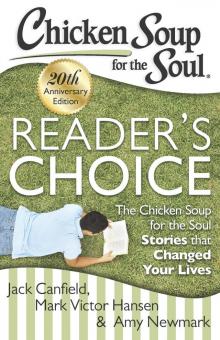 Chicken Soup for the Soul: Reader's Choice 20th Anniversary Edition
Chicken Soup for the Soul: Reader's Choice 20th Anniversary Edition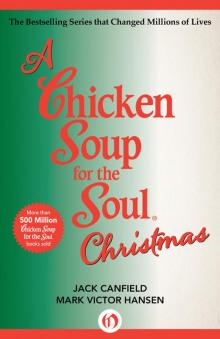 Chicken Soup for the Soul Christmas
Chicken Soup for the Soul Christmas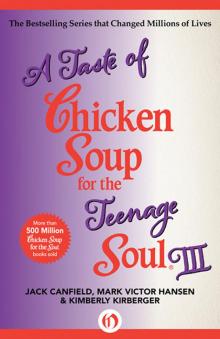 Taste of Chicken Soup for the Teenage Soul III
Taste of Chicken Soup for the Teenage Soul III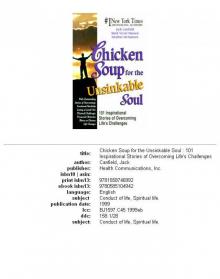 Chicken Soup for the Unsinkable Soul
Chicken Soup for the Unsinkable Soul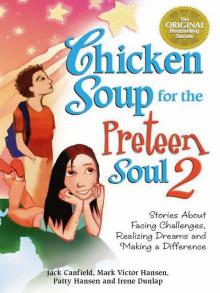 Chicken Soup for the Preteen Soul II
Chicken Soup for the Preteen Soul II